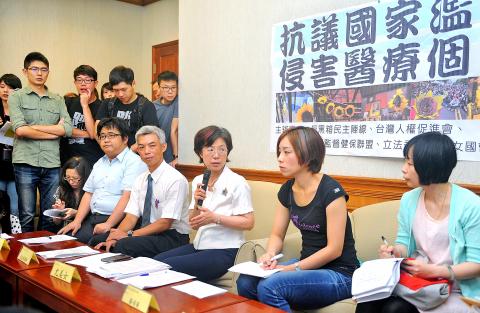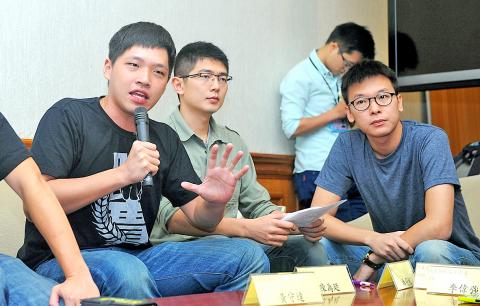Lawyers, student leaders and a legislator yesterday accused law-enforcement agencies, including prosecutors and the police, of abusing their powers and intimidation for summoning and questioning hundreds of Sunflower movement participants since the movement’s protests ended on April 10.
More than 400 people have been questioned or investigated by the prosecutors and the police, who obtained the protesters’ personal and medical information — sometimes illegally — since the three-week-long occupation of the Legislative Yuan’s main chamber, they said.
“There are people who were simply sitting outside the Executive Yuan [during the storming] being investigated, and some students have been summoned for questioning just because they left their contact numbers when accompanying their friends to a hospital,” Democratic Front Against Cross-strait Trade in Services Agreement convener Lai Chung-chiang (賴中強) told a press conference at the Legislative Yuan.

Photo: Liao Chen-huei, Taipei Times
Lee Chun-ta (李俊達), a representative from the student group Democracy Tautin, and Black Island Nation Youth Front spokesperson Huang Yu-Fen (黃郁芬) criticized Taipei hospitals for providing visit records to authorities. They accused the hospitals of flouting medical ethics and said that the hospitals had become the authorities’ stooges.
“Hospitals are supposed to be a place where lives are saved and injuries attended to, but now they have become the abettor of the authorities’ persecution as people are being hunted down by the state power for visiting a medical facility,” Huang said.
However, Lee Wui-chiang (李偉強), head of the Ministry of Health and Welfare’s Department of Medical Affairs, denied that hospitals had turned over personal information about patients to the police, adding that the ministry had confirmed and reconfirmed with hospital officials that such details had not been given out.

Photo: Liao Chen-huei, Taipei Times
Democratic Progressive Party Legislator Yu Mei-nu (尤美女) said she wanted to know why, “if the police could identify participants involved in the movement so easily, without help from the hospitals, those police officers who wielded batons against protesters have been so difficult to find?”
A National Fire Agency official said the Taipei City Fire Department did hand over information on 36 people, out of the 42 requests that it received from the Taipei City Police Department.
“They were all processed as confidential documents,” he said.
Attorney Liu Chi-wei (劉繼蔚) said the Emergency Medical Services Act (緊急救護法) prohibits the disclosure, without permission, of “information, known or held from performing … duties.”
“Officials have not been held politically accountable for the state violence committed, while people are now intimidated by the state power… The laws are simply tools and toys for the Chinese Nationalist Party [KMT] government to play with,” said Dennis Wei (魏揚), a key figure in the Sunflower movement.
Lin Fei-fan (林飛帆), another student leader, said prosecutors are going beyond the call of duty as part of the government’s intimidation measures against those who “dare to express their dissent against the establishment.”
Student leader Chen Wei-ting (陳為廷) questioned the need to interrogate hundreds of people when the main actors of the movement have already, on their own initiative, offered to help prosecutors and police clarify what occurred during the protests.
“President Ma Ying-jeou (馬英九) said on June 4, commemorating the Tiananmen Square Massacre, that he hopes ‘democracy and rule of law could one day become the common language of the two sides of the [Taiwan] Strait.’ Ma is truly working toward that goal, since now we are getting closer to China’s standard [of repression],” Chen said.

NATIONAL SECURITY THREAT: An official said that Guan Guan’s comments had gone beyond the threshold of free speech, as she advocated for the destruction of the ROC China-born media influencer Guan Guan’s (關關) residency permit has been revoked for repeatedly posting pro-China content that threatens national security, the National Immigration Agency said yesterday. Guan Guan has said many controversial things in her videos posted to Douyin (抖音), including “the red flag will soon be painted all over Taiwan” and “Taiwan is an inseparable part of China,” while expressing hope for expedited “reunification.” The agency received multiple reports alleging that Guan Guan had advocated for armed reunification last year. After investigating, the agency last month issued a notice requiring her to appear and account for her actions. Guan Guan appeared as required,

A strong cold air mass is expected to arrive tonight, bringing a change in weather and a drop in temperature, the Central Weather Administration (CWA) said. The coldest time would be early on Thursday morning, with temperatures in some areas dipping as low as 8°C, it said. Daytime highs yesterday were 22°C to 24°C in northern and eastern Taiwan, and about 25°C to 28°C in the central and southern regions, it said. However, nighttime lows would dip to about 15°C to 16°C in central and northern Taiwan as well as the northeast, and 17°C to 19°C elsewhere, it said. Tropical Storm Nokaen, currently

PAPERS, PLEASE: The gang exploited the high value of the passports, selling them at inflated prices to Chinese buyers, who would treat them as ‘invisibility cloaks’ The Yilan District Court has handed four members of a syndicate prison terms ranging from one year and two months to two years and two months for their involvement in a scheme to purchase Taiwanese passports and resell them abroad at a massive markup. A Chinese human smuggling syndicate purchased Taiwanese passports through local criminal networks, exploiting the passports’ visa-free travel privileges to turn a profit of more than 20 times the original price, the court said. Such criminal organizations enable people to impersonate Taiwanese when entering and exiting Taiwan and other countries, undermining social order and the credibility of the nation’s

‘SALAMI-SLICING’: Beijing’s ‘gray zone’ tactics around the Pratas Islands have been slowly intensifying, with the PLA testing Taiwan’s responses and limits, an expert said The Ministry of National Defense yesterday condemned an intrusion by a Chinese drone into the airspace of the Pratas Islands (Dongsha Islands, 東沙群島) as a serious disruption of regional peace. The ministry said it detected the Chinese surveillance and reconnaissance drone entering the southwestern parts of Taiwan’s air defense identification zone early yesterday, and it approached the Pratas Islands at 5:41am. The ministry said it immediately notified the garrison stationed in the area to enhance aerial surveillance and alert levels, and the drone was detected in the islands’ territorial airspace at 5:44am, maintaining an altitude outside the effective range of air-defense weaponry. Following